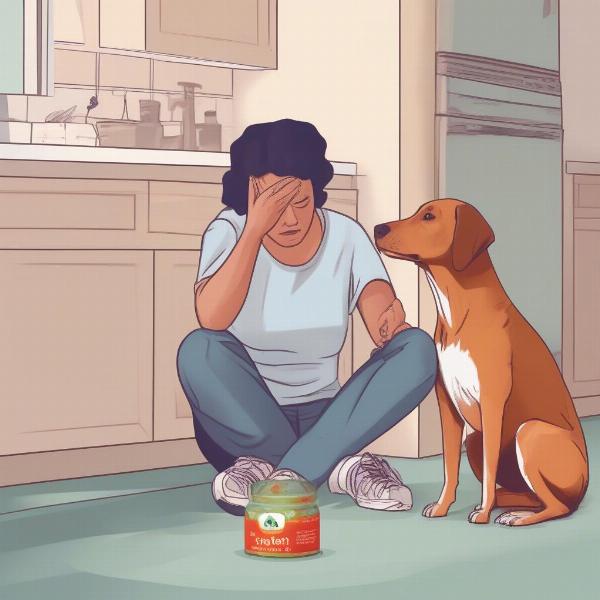Sugar-free jello may seem like a harmless treat, but it can be incredibly dangerous for dogs. The artificial sweetener most commonly used in sugar-free jello, xylitol, is highly toxic to our canine companions. Even small amounts can cause serious health problems, including liver failure and even death. This article will delve into the dangers of xylitol, why you should avoid giving your dog sugar-free jello, and safer alternatives to satisfy your dog’s sweet tooth.
Why is Sugar-Free Jello Dangerous for Dogs?
The primary concern with sugar-free jello is the presence of xylitol. Xylitol is a sugar alcohol that is safe for human consumption but has a drastically different effect on dogs. In dogs, xylitol causes a rapid release of insulin, leading to a dangerous drop in blood sugar (hypoglycemia). This hypoglycemia can occur within 10-60 minutes of ingestion and manifest as weakness, lethargy, vomiting, loss of coordination, seizures, and even coma.
 Xylitol Toxicity in Dogs
Xylitol Toxicity in Dogs
Beyond hypoglycemia, xylitol can also cause severe liver damage in dogs. While the exact mechanism isn’t fully understood, it’s believed that xylitol interferes with the liver’s ability to function properly. This can lead to liver failure, which can be fatal.
What Are the Symptoms of Xylitol Poisoning in Dogs?
Recognizing the symptoms of xylitol poisoning is crucial for prompt veterinary intervention. If you suspect your dog has ingested sugar-free jello or any product containing xylitol, watch for the following signs:
- Vomiting
- Weakness
- Lethargy
- Loss of coordination
- Tremors or seizures
- Collapse
- Jaundice (yellowing of the gums and whites of the eyes)
What Should I Do If My Dog Eats Sugar-Free Jello?
If your dog ingests sugar-free jello, contact your veterinarian or an emergency animal hospital immediately. Time is of the essence when it comes to xylitol poisoning. The sooner your dog receives treatment, the better their chances of recovery. Inform your veterinarian about the amount of sugar-free jello consumed and the ingredients listed on the package.
Are There Safe Alternatives to Sugar-Free Jello for Dogs?
While regular jello isn’t toxic to dogs, it offers little nutritional value and the high sugar content isn’t ideal. Instead of offering jello, consider healthier treats such as small pieces of fruits like apples (without the core and seeds) or bananas, or dog-specific treats made with natural ingredients.
Can Dogs Have Regular Jello?
Regular jello, while not as dangerous as the sugar-free variety, is still not recommended for dogs. The high sugar content can contribute to weight gain, dental problems, and other health issues. Additionally, some jello flavors contain artificial colors and flavors that can be harmful to dogs.
Conclusion
Sugar-free jello is a serious hazard for dogs due to the presence of xylitol. Even small amounts can have devastating consequences. Always keep sugar-free products, including jello, out of your dog’s reach. Opt for healthier, dog-friendly treats to keep your furry friend happy and safe.
FAQ
- What is the most dangerous ingredient in sugar-free jello for dogs? Xylitol is the most dangerous ingredient.
- How quickly can xylitol poisoning affect a dog? Symptoms can appear within 10-60 minutes of ingestion.
- Can dogs eat regular jello? While not toxic, regular jello isn’t recommended due to its high sugar content and artificial ingredients.
- What are the signs of xylitol poisoning? Vomiting, weakness, lethargy, loss of coordination, tremors, seizures, collapse, and jaundice.
- What should I do if my dog eats sugar-free jello? Contact your veterinarian or an emergency animal hospital immediately.
- What are some safe treats for dogs? Small pieces of fruits like apples (without the core and seeds) or bananas, or dog-specific treats made with natural ingredients.
- Why is xylitol toxic to dogs? Xylitol causes a rapid release of insulin in dogs, leading to a dangerous drop in blood sugar and potential liver damage.
ILM Dog is your trusted resource for expert advice on dog care and wellbeing. We offer comprehensive information on everything from breed selection to nutrition and training. For more insightful articles on dog health and care, visit ILM Dog. Contact us at [email protected] or +44 20-3965-8624 for personalized advice.